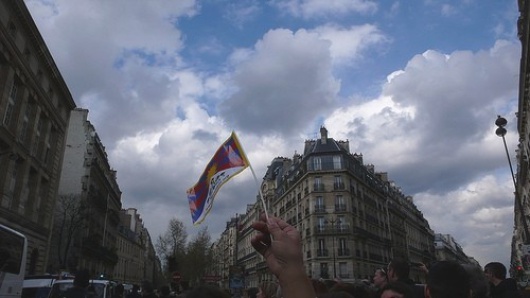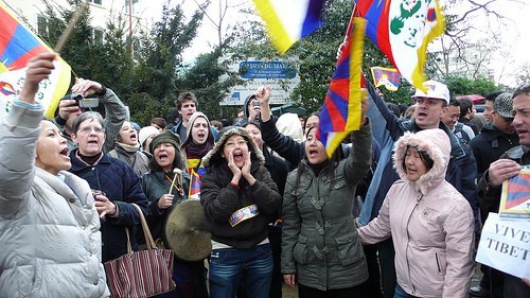Olympic games: Europe up in arms over Tibet
Published on
Translation by:
Susannah Readett-BayleyA huge victory for some, enormous disappointment for others. For the first ever time, the Olympic torch has been extinguished under mass pressure, as Europe makes itself heard
The Chinese were expecting real support for this important symbol, the first step in the run up to the Olympic Games, the only worldwide event that will bring together more than 200 countries. But in Paris on 7 April, chaos erupted to such a degree that the official ceremony due to be held at Hotel de Ville and the last stages of the torch’s planned route through Paris had to be cancelled. The militants supporting Tibet had won; no one was going to forget the Tibet cause today.
 Draping the flags in Paris, 7 April (Photo: Prakhar/ Flickr)
Draping the flags in Paris, 7 April (Photo: Prakhar/ Flickr)
Flags were hung on the Eiffel Tower and on Notre Dame Cathedral with the Olympic rings depicted as handcuffs, as processions of particularly vengeful protesters turned out. A general hysteria gradually overtook the crowd and the police, and several times it overflowed into violence. While some protesters lay down across the road to prevent the flame from passing, others physically tried to put it out by attacking the sports celebrities who were carrying it.
Fallout from the Paris protests
The 3000 police present everywhere only just managed to contain attacks from the crowd on the Olympic procession - sometimes needing to resort to force. 'Instead of exporting democracy, we are importing methods used by some of the biggest dictators in the world,' announced one protestor handcuffed roughly by the police. It had gone too far, the Chinese dignitaries cut short the torch’s procession and were eventually forced to put it out.
The president of the IOC Jacques Rogge immediately condemned the troubles that broke out in London and then Paris. He denounced a link between the universal symbol of peace that the Olympic torch represents and the situation in Tibet. The IOC, who agreed that China should host the Olympic Games seven years ago under the condition that their human rights record improved, has been severely criticised for its passiveness and its hypocrisy.
 'Jacques Rogge promised that each time there was a problem with human rights in China that he would be there to support the victims. He has never been there,' said Robert Ménard, general secretary of Reporters without Borders and the main instigator of the protests on 8 April. The violence will not have been seen by Chinese TV viewers because of image censorship there. If Peking admits that there was any trouble at all, its significance will be severely played down.
'Jacques Rogge promised that each time there was a problem with human rights in China that he would be there to support the victims. He has never been there,' said Robert Ménard, general secretary of Reporters without Borders and the main instigator of the protests on 8 April. The violence will not have been seen by Chinese TV viewers because of image censorship there. If Peking admits that there was any trouble at all, its significance will be severely played down.
Paris protests (Photo: Prakhar/ Flickr)
Sarkozy will represent Europe
The London and Paris protests demonstrate the huge divide between the non-commital position of European leaders who have hesitated in taking a stand, and the anger of the population who turned out in mass to protest. France, who is set to take the helm of the EU from July to December 2008, will have an influential voice. However, for the moment its lack of clarity characterises its diplomatic position.
Having first opposed any kind of boycott, French president Nicolas Sarkozy then declared that 'all possibilities are open'. On 6 April, Rama Yade, French secretary of state for human rights announced that the French president would attend the opening ceremony of the games under three conditions: an end to violence against the population, the freeing of political prisoners and clarity of Tibetan events and an open dialogue with the Dalai Lama. These conditions were first disputed by the Elysée, before being confirmed the following day. In short, the president and his foreign minister, Bernard Kouchner, must clarify their position over the next few months as they will be representative of the entire EU as presidents for six months.
Blood bath in Tibet
In any case, what is happening is nothing short of an international protest. Just look at militants of the Tibetan cause climbing the Golden Gate in San Francisco, when the torch arrived on 8 April amidst huge protests. This general chaos could be enough to push the IOC to completely cancel the Olympic torches world tour. 'We must reconsider this possibility together,' confirmed the vice president of the IOC, the Swede Gunilla Lindberg, on the same day.
It is also an international movement which could have serious repercussions, particularly on the people of Tibet. International support could further encourage independentists to dig their heels in further and step-up protests from Lhasa. To what point will the leaders of China allow their authority to be questioned? What could the riposte from Chinese leaders on the Tibetan people be? In wanting to help the people of Tibet, this international support could, paradoxically, result in a veritable blood bath.
Got something to say about Tibet? Sign up to our e-community and speak up in our human rights forum dedicated to the
Photos: homepage (richdrogpa/ Flickr), in-text (prakhar/ Flickr), in-box protestor in Antwerp, Belgium (pietel/ Flickr)
Translated from JO : l’Europe s’enflamme pour le Tibet




